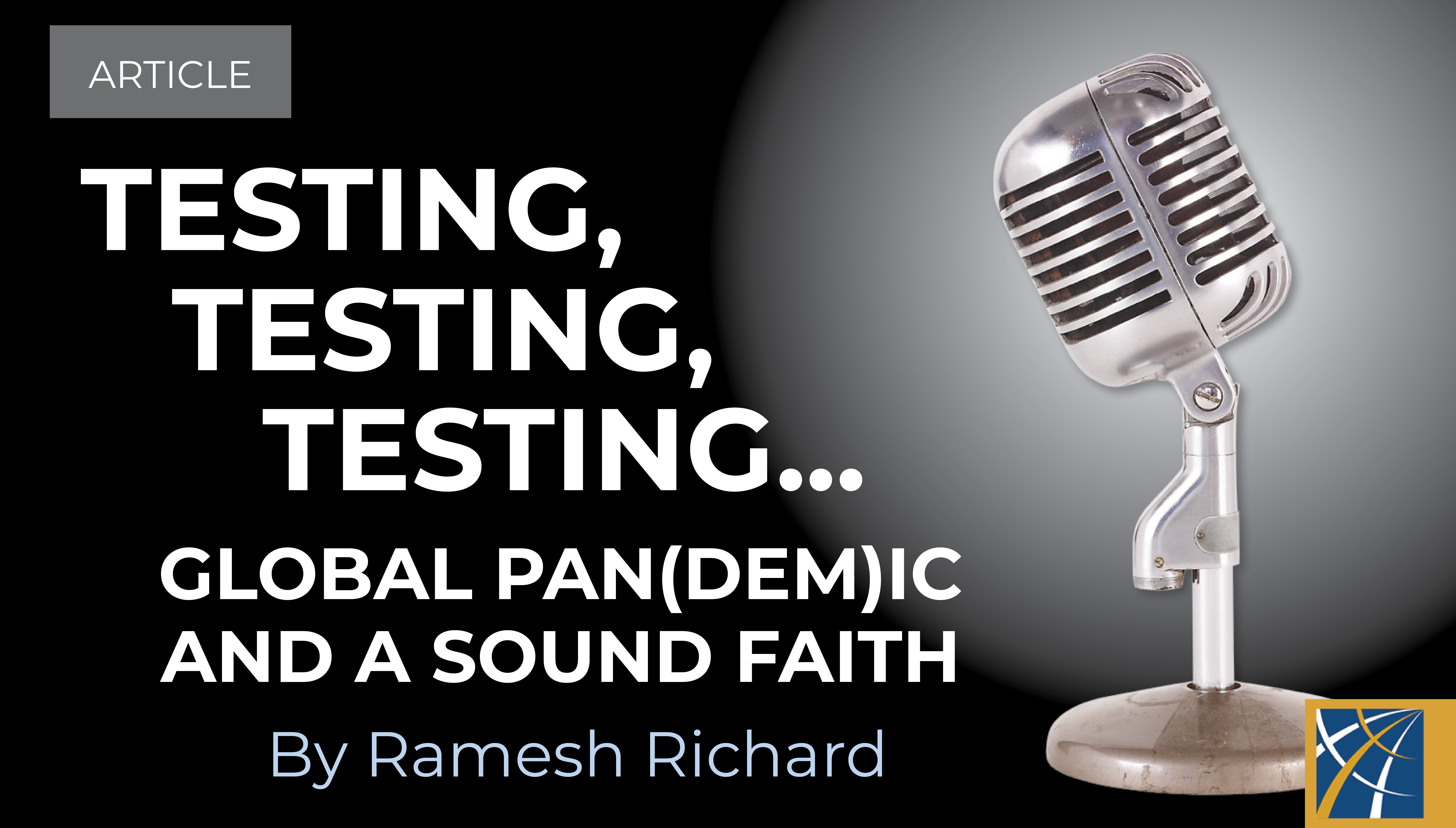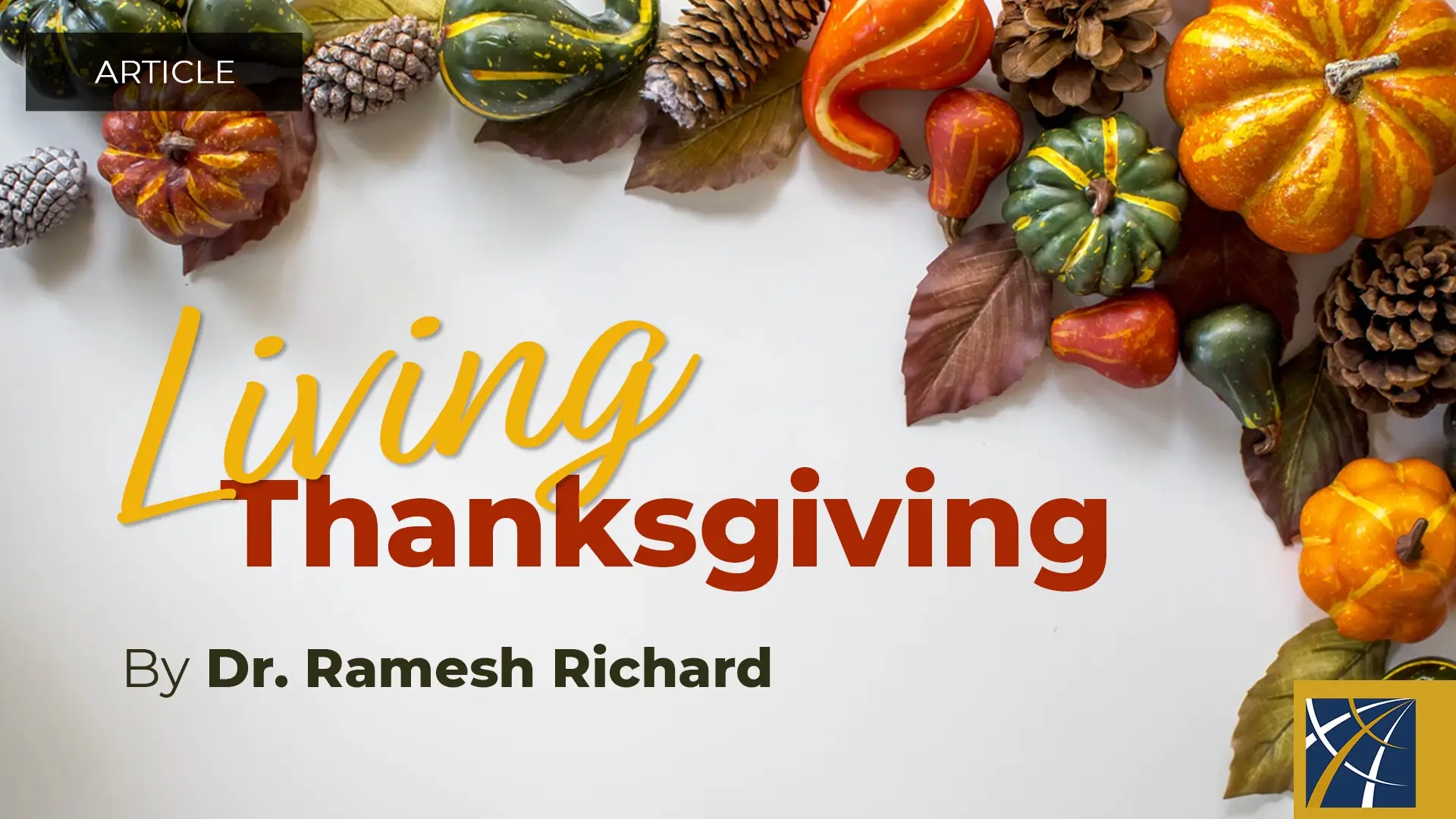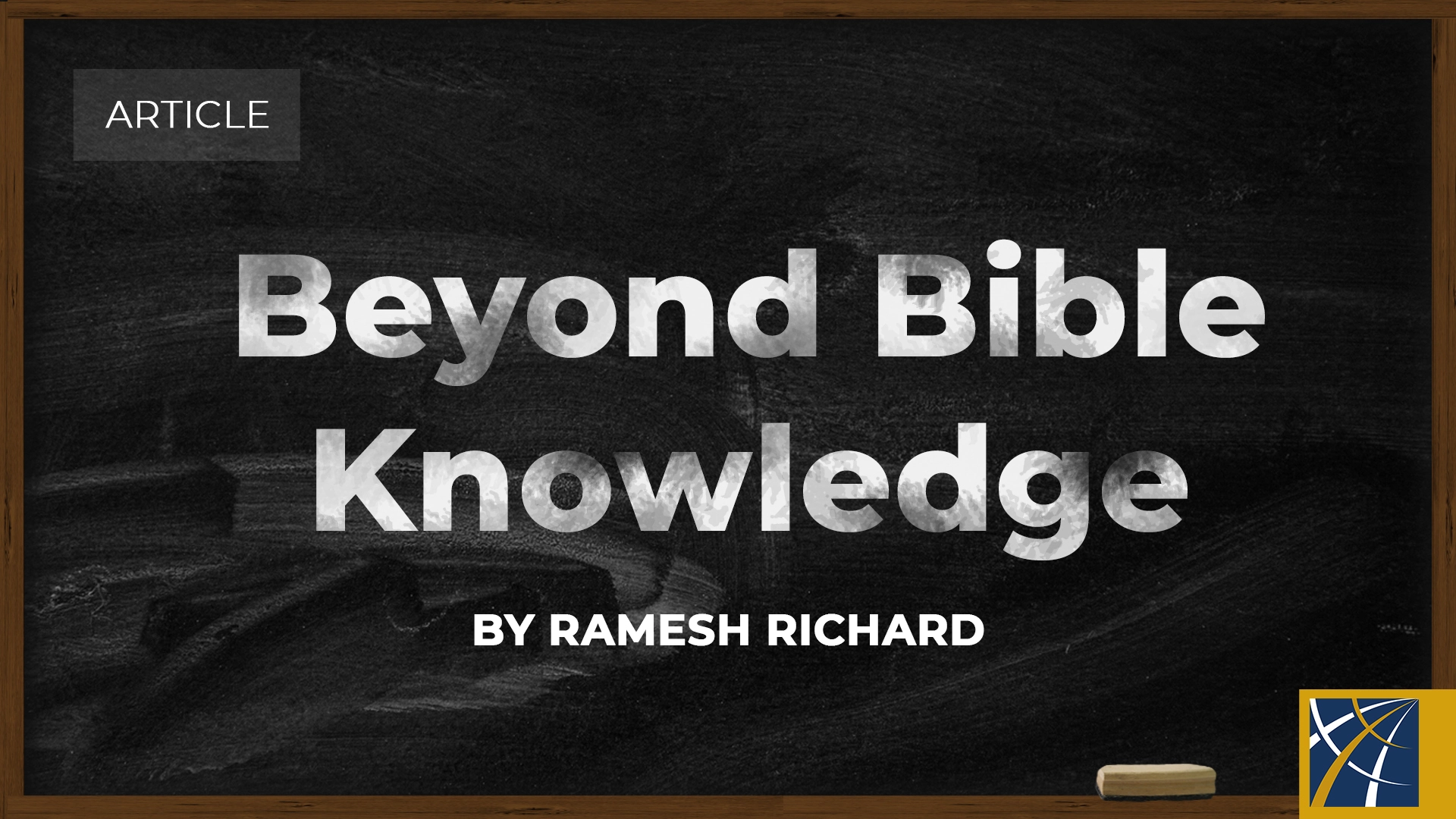Volume 21, Number 1
rreach.org
Summer 2020
TESTING, TESTING, TESTING …
GLOBAL PAN(DEM)IC AND A SOUND FAITH
Ramesh Richard
Technical assistants attach a microphone to my face or jacket to ready me for another talk. “Say something. We need a sound check.” Earlier in my speaking career I used to count up or down for sound checks. On occasions I have quoted Scripture, mimicking my dad, who ascended Martin Luther’s pulpit in Wittenberg, recited aloud, “The just shall live by faith,” and quickly alighted. These days, I resort to a dry three-peat: “Testing, testing, testing.”
A global contagion has unnerved the collective human psyche. Panic is embedded in pandemic, not solely in letter, but in spirit. The scale and speed of this pathogen have united the world in fear. You, too, may have felt a bit anxious over these exceptional days of isolation, contact-tracing and testing, testing, testing.
These turbulent times tear down the walls of our many-roomed global castle to reveal all its load-bearing beams with no adequate foundation. Unsupported, these beams appear strong but cannot carry the weight of our world’s realities. We have quickly found out how flimsy and vulnerable we are, as individuals and systems, to hold the world together. We grope for every possible shoring-up instrument, substantive and superficial, to alleviate our terror. One nation’s president superstitiously held up two religious charms—“My bodyguards,” he called them—as divine protection from the virus.
Where will we find some hope and a future that rightly divides truth? A few pastoral assistants have called on me to say something, a sort of a sound check, to find personal meaning in natural disaster.
“Is this the ‘end times’?” my international host and a leading denominational leader asked me as he picked me up past immigration and customs. “Well,” I mumbled, “the latter days began in the first century, and we are further along than ever before.” He pointed out that “in the great tribulation half the world would be wiped out, so it must not be.” In any case, if the preview of the final days is so bad, we can’t imagine the anxiety, calamities and the afflictions of “the tribulation, the great” (Rev. 7:14 literal), unequaled in the past and unparalleled in the future (Matt. 24:21). As many as possible must be eternally saved, as quickly as possible. The gospel is not good news if it reaches anyone anywhere too late.
“Are these God’s judgments upon us?” wondered an older relative of mine. “If these are God’s judgments,” I replied, “we should have been wiped out a long time ago.” At every disaster (and the centuries have seen many pandemics), the question of God’s immediate retributive judgment comes up. Disasters, natural and human-made, provoke the human race to a renewed sensitivity to God’s moral standards that we flagrantly flout.
“What is God saying to us? What is God doing to us?” In rapid fire, these questions came in personal conversation with one of Christianity’s leading voices.
For every believer’s sake, I will recast my metaphor in practical terms. What is God saying and doing to us? This plague pandemic is like a sound check—testing, testing, testing. It reveals the soundness of at least three dimensions of our Trinitarian Faith.

This plague pandemic is like a sound
check—testing, testing, testing. It
reveals the soundness of at least three
dimensions of our Trinitarian Faith.
An
Identity Check
Disruptions always test the quality of our self-identity. We form identities for other people’s benefit, and sometimes at another’s expense. Psychologists and sociologists point to multiple types of identities with many inputs and components.
For instance, identity politics divides by race, color, caste, religion, gender and so on. Identity economics categorizes society by monetary markers, whether in a three-class or nine-class hierarchy.
As with the American Great Depression, widespread crises serve to flatten the condescension of the rich and the posturing of the poor. This 2020 pandemic does not respect the economic gap, nor help bridge the politics gap, even while we are all understanding ourselves better and becoming more real to our neighbors!
Our loved ones, with whom we now live 24/7, are beginning to know us better, but also, mostly unintentionally, they are helping us to know ourselves better. In an ironic turn, we are putting on external face masks while we unmask our interiors.
Disruption, especially, unmasks our character. A key pointer to the quality of our identity is how we handle surprises, losses and interruption. How consistent or conflicted are we on the inside? How have we formed the values that control our behavior? What are the sources of our identity-formation? Does it spring from family expectations, peer pressure or public models? From pleasing those to whom we belong, from how we wish to appear to others, or from how we externally perform?
When housed in isolation, the three features of self-identity—our belonging, our appearance and our performance—take a severe beating. Our multiple identities, drawn from our expected social roles, fall apart as proximity with those we seek to please or impress is suspended. We become uncomfortable because we have prioritized how others view us more than how those we live with and love most view us. Any coherence and constancy we had previously established for our self-identity are now incompatible with our “authentic” self.
But wait! Whether under normal or plague conditions, Christian self-view depends neither on values derived externally nor value sourced internally. We discover, establish and grow with a better identity source, an ultimate one. A Christian embraces internally the external source of her or his personal value, which arises from the outside and is redeemed on the inside. This new self-value is what is ultimately true of one’s Self.
Where, or better, to whom, do we go to find what is ultimately true about ourselves? Horizontal sources that encourage us to be “true to our self,” to do what is natural, prove defective. If I were to be true to my natural self, I would contribute more to the disruption. I don’t think you want that.
How may this deformed self be rescued? Not by a self-based reformation, but by regeneration into a new self, a replacement of the old self. In Christianity, one is born again from above into a new, true Self. Our spiritual redemption makes it possible to subscribe to what the Christian’s God says about our new true identity in him.
Here’s how the Trinitarian God of Christians revises the old situation and replaces it with enduring value so that a new identity can be strengthened, despite any short-term disruption of roles and responsibilities or long-term deprivations of routine and relationships:
One, we belong to the loving Father as his children, a family status never to be disrupted, even if we run away from him. He chose us in love, knowing everything about us.
Two, God will never devalue how we appear (an external matter so crucial to many) because of apparent lack, real loss, aging or death. Why? Because we are now part of his beautiful bride, whom he is transforming into a spotless beauty to be someday presented in stunning display, more delightful and talented than any participant in sexist Miss Universe competitions.
And, three, what about our performance? God’s recognition does not depend on our success. Social acceptance relies heavily on conditional and cultural metrics; God’s Holy Spirit blesses his children fully and never loses use for the gifts he has given us to serve others. He never withdraws his endowments of calling and competence as we pursue fruitfulness.
Our new identity in the Triune God is like an oxygen mask that helps us survive the turbulence, even a crash-landing. I usually neglect the flight steward’s announcement at take-off. But one sentence always gets my attention: “If you are traveling with a child, please attend to yourself first, then the child.” I have wondered if this self-care was too self-preserving. Not at all. We don’t care for ourselves as an end, just as a means to care for others who need more care than ourselves. Otherwise, we both die. And in Christian principle, we are willing to die that others might live. Our God-sourced identity becomes a new mode to execute our service to others. Our service roles no longer form our identity; they give us outlets to minister out of our identity throughout this time of distress.
During this unexpected grant of homebound time, may I fulfill professorial obligation and encourage you to look up Scripture on the incredible truths of personal identity? If you have a cross-reference feature on your electronic or hard-copy Bible, check the three verses I give you below. It will lead you to many, many more.
- Belonging as God’s child
I am known and chosen by God the Father (1 John 3:1). - Appearance as God’s bride
I am loved and valued by God the Son (John 15:13). - Performance as God’s instrument
I am gifted and made competent by God the Spirit (1 Cor. 12:7).
Let me close this identity soundness test with a rich thought from Dr. J. I. Packer, whose Knowing God my 92-year-old mother-in-law devours every year. Process these three paragraphs slowly, absorb deeply, and then claim fully. How God thinks about you and what God holds about you is found in who God says you are:
“What matters supremely, therefore, is not, in the last analysis, the fact that I know God, but the larger fact which underlies it—the fact that he knows me. I am graven on the palms of his hands. I am never out of his mind. All my knowledge of him depends on his sustained initiative in knowing me. I know him because he first knew me, and continues to know me. He knows me as a friend, one who loves me; and there is no moment when his eye is off me, or his attention distracted from me, and no moment, therefore, when his care falters.
This is momentous knowledge. There is unspeakable comfort—the sort of comfort that energizes, be it said, not enervates—in knowing that God is constantly taking knowledge of me in love and watching over me for my good. There is tremendous relief in knowing that his love to me is utterly realistic, based at every point on prior knowledge of the worst about me, so that no discovery now can disillusion him about me, in the way I am so often disillusioned about myself, and quench his determination to bless me.
There is, certainly, great cause for humility in the thought that he sees all the twisted things about me that my fellow humans do not see (and am I glad!), and that he sees more corruption in me than that which I see in myself (which, in all conscience, is enough). There is, however, equally great incentive to worship and love God in the thought that, for some unfathomable reason, he wants me as his friend, and desires to be my friend, and has given his Son to die for me in order to realize this purpose” (Knowing God, Downers Grove, IL: InterVarsity Press, 1993, 41-42).
Truly nothing can disrupt the quality of this identity. There you are! A Trinitarian Christianity provides personal meaning in the face of natural disaster. It passes the identity check. You can come to accept what the Ultimate Source of your Self truly believes about you. You can exchange your old, false self-identity that was defined by your roles for a new, true self-identity that you express through your roles and responsibilities. Will you embrace it more and more to better endure this time of personal gloom and global doom?
Disaster checks the quality of our adulting—a matur- ing process of turning us into spiritual adults when we would rather remain as spiritual infants.
A Global Proclamation Academy delegate maturing by his exposure to God’s Word.
A
Maturity
Check
I heard a new word yesterday: adulting. Does it sound right to you? A bit risqué? Disaster checks the quality of our adulting—a maturing process of turning us into spiritual adults when we would rather remain as spiritual infants. Crises accelerate the spiritual maturing process. I know no other way to become mature or verify maturity than through trials.
We don’t go looking for trouble, like Eastern gurus who exalt the cathartic benefits of suffering. They strip naked in the cold, or walk on beds of coals, or pull temple carts with hooks embedded in their bodies. Christianity does not prescribe spiritual cleansing by a merit-based, deliberate pursuit of distress. We receive judicial cleansing when we accept the gift of salvation, a cleansing not obtained by good works, but by the Lord Jesus through his Cross-payment on our behalf. So we shall not run toward trouble to force maturity.
But we do not run away from trouble either. Avoiding the swing of the pendulum calls for a realistic view of troubles, neither seeking nor avoiding them, but being open to them as inevitable features of a fallen race and a broken world. And beyond merely embracing a view of reality, we examine our attitudes toward them, our reactions to them, and our actions in them.
A complex molecule, invisible except under the microscope, looks as though it wears a crown and has brought the world to its knees. It also tests the quality of a believer’s maturity. Are we dull of hearing, as the Hebrews were, still returning to elementary principles of legalistic suffering to obtain grace and questioning the Father’s disciplinary proof of our sonship (Heb. 6; 12)?
Exhortations to press on to maturity by faith amid suffering weave through the prototypical themes of the book of Hebrews (e.g., Heb. 11). Believers should not keep—to coin a parallel term—infanting: preferring and drinking spiritual milk. They are called to adulting, that is, desiring and downing solid food. Maturing Christians exhibit adult attitudes and practice the activities of spiritual grown-ups.
Pressing on to maturity is also a standard theme in the New Testament. The apostle Paul consistently wrote about pressing on, reaching forward and striving toward what is yet to be, based on what is already true (Phil. 3:12–14). Maturity can be cultivated and improved by a Trinitarian Christianity through all kinds of troublesome circumstances. A Trinity-based spirituality orients life to the Father, in the Son and by the Spirit.
We mature to the glory of the Father as the reason and effect of our existence. We mature toward the Father when all dimensions of our lives purpose toward glorifying God, when our virtues and values, our beliefs and behavior are concerned about making God look great to all sensate creation and result in their admiration for his genius. Spiritual adults have learned to increasingly deflect honor to the Father. They acknowledge the triumvirate of God’s providence—total goodness, global power and personal wisdom—as they cry to him in the middle of trials. Maturing godliness is simply living to the fame of God the Father in whatever circumstance we find ourselves, whether self-made, human-made, Satan-made, all of which are either God-made or God-allowed.
We mature in the name of the Son as life-giving and exemplary while enduring distress. The great passages of the final discourses of Christ in John, especially John 15, quite plainly declare that without him we can do nothing—no fruit nor lasting fruit—unless we abide in him. Christians also undergo circumstances as Jesus did—in humility looking out for another’s interest and for opportunities of service and sacrifice. We are named after the greatest person in all history, the One and Only Son of God. When in trouble we call to the Father, who will otherwise not hear us, in his name. We await the day when his name will be recognized above every other name—above the names of the rich, powerful and famous; above the names of principalities, powers and persecutors; even above the names of viral diseases like SARS, Ebola and COVID-19. The more we identify with the Name of Jesus, the more Christianly we are. Anything done in the name of Christ, out of a growing connection with him and “walking as he walked,” is a maturing Christianity.
We mature by the power of the Spirit as the one who empowers godliness and Christlikeness in attitude and activity regardless of circumstances. We declare that we are insufficient for meeting disaster. Unless the Spirit enables and equips us, spiritual vitality is impossible. Life in God’s Spirit happens by keeping lockstep with the Spirit, and thereby not using difficult conditions as excuses to return to patterns of fulfilling the lusts of the flesh. Synergy with the Holy Spirit provides the energy of the Holy Spirit toward spiritual maturity.
One of the best ways to evaluate maturity is to look for evidence. But where and how? We certainly can’t measure salvation by our perfections or their lack. If practical perfection were the mark of spiritual maturity, we would permanently lack assurance. It is best to find salvation assurance in what God has to say about our eternal life in his Word—an absolute prerequisite for confidence in crisis. But we can measure our progress to maturity by nurturing a vibrant relationship with God. Growth to spiritual maturity depends on the Spirit’s increasing control and production of his fruit in our lives. We merely provide the willingness and he mightily provides the power for spiritual progress.
Will you study the nine aspects of the fruit of the Spirit in Galatians 5:22? A dictionary is good enough to convict us of our failures. Then survey biblical cross-references to the verse and its parts. You will come up with more personal applications than any Bible commentary will as you become familiar with the Bible and are already immersed in your unique circumstance. Ask yourself, “As a result of my long, drawn-out crises, am I exhibiting more and better:
Love—rather than pride, selfishness, hatred
Joy—rather than discontent, grumbling, ingratitude
Peace—rather than anxiety, worry, panic
Patience—rather than impatience, irritability, exasperation
Kindness—rather than meanness, harshness, unforgiveness
Goodness—rather than wickedness, evil, immorality
Faithfulness—rather than unreliability, infidelity, posturing
Gentleness—rather than rudeness, divisiveness, bitterness
Self-control—rather than greed, hedonism, narcissism?”
Circle any words that are right about you and invite God’s Holy Spirit to empower you with the will and the wisdom to overcome the temptation to yield to sin. He will “adult” you.
Trinitarian Christianity passes the tests of trials to develop a meaningful life devoted to the glory of God the Father, in the name of the Son, and empowered by the Holy Spirit, for the good of the Christ-lover-believer-follower.
We can measure our progress to maturity by nurturing a vibrant relationship with God. Growth to spiritual maturity depends on the Spirit’s increasing control and production of his fruit in our lives. We merely provide the willingness and he mightily provides the power for spiritual progress.

A Security Check
Security builds on survival—a basic human need—but takes a longer view. You and I have physically survived until now, or we wouldn’t be in dialogue. But physical survival does not guarantee security. The onslaught of a dangerous infectious agent threatens the physical health of tens of thousands, myself included. It also undermines economic and psychological safety.
“Shelter-in-place” mandates restrict current movement and activity in our city. Economic upheaval eerily looms over any benefits formerly afforded by economic freedom. The international supply chain is emptied of action, and government relief bills fail to restore confidence in financial markets. Our anxiety levels have soared, affecting our mental health. No one expected our seemingly stable world to be overturned so fast, so easily and so closely.
Longevity is not guaranteed. Any self-confident invincibility summarily departs at the widespread presence of an unseen, novel virus. The invisible enemy attacks our productivity, bringing on a realization of the eventuality of mortality. We will die sooner or later.
The current situation confirms that politics and economics may provide some guidance for survival but cannot serve as our final security. They can give us options but not directions for life. They can give us freedom but not hope for this life or the next. When we stand at disaster’s edge, any step forward with politics, economics or religion as the source of our security will be a suicidal misstep into the deep.
Maybe we should move backward and slow everything down to a stop. As we have.
This time of forced and unexpected shut-down is not for people to go to sleep and stay asleep. It is not for waiting to reboot just where we left off. We need to replace damaged and corrupt “security files.” Even before full functionality returns to society, we can restart life right away in “safe mode.”
In Christian conviction, an objectively based, biblical view of security founds and frames the strength of subjective wellbeing. It fortifies the only sense of security that survives this life into the next. The Trinitarian God again comes to the fore in the blessing of survival, safety and security of an eternal kind. As soon as our survival is secured for all time in his salvation, this day and tomorrow are taken care of as well.
For a third set of Scriptures, this time about the truths of eternal safety for believers, look up the verses I share, again with a cross-reference exercise. You can go to many more with dedicated study time. Your security forever is guaranteed in:
- God the Father’s eternal purpose (Rom. 8:28–30) and mighty power (1 Pet. 1:3–5) for us. All whom the Father called according to his purpose are glorified already.
- God the Son’s priestly intercession (Heb. 7:24–25) and protective involvement (John 10:28–29) for us. We can never be snatched from the hand of the Son.
- God the Spirit’s once-for-all regeneration (Tit. 3:5) and sealing (Eph. 4:30) of the believer. As in physical birth, once born, we can’t be pre-born, reborn or unborn.
A Trinitarian Christianity holds that God is committed to our security on earth and into heaven. Our security is based on his Son’s singular, decisive and victorious resurrection in defiance of our persistent and final vulnerability to physical death.
Even now, as I write from the back room of our house, I am comforted at the sight of a deeply meaningful gift from Eastern Ukraine. With his life having been spared, a pastor took the wood off his bombed roof and inscribed a claim to safety: “In peace I will lie down and sleep, for you alone, Lord, make me dwell in safety” (Ps. 4:8). The wrecked wood invokes my trust in the Lord for consolation day and night.
For a devotional workout throughout your stay-at-home, I invite you to stay in the book of the Psalms—my first resort and best reminder of security in tumultuous times. Because of the nature of divine truth and the commonality of human experience, you may distribute your anxiety to saints of old who will carry it along with you.
Type Psalms of Trust in your search engine. You will find dozens of websites counting and classifying them.1 Add Psalms of Thanksgiving to your search, and there will be many more to ponder. In addition, you can study one-off verses that fit the “trust, confidence, thanksgiving and assurance” motifs. You will be overwhelmed by the incredible declarations of divine security not only in the next life, but now.
A leading candidate for quiet reflection is the famous Psalm 46, Martin Luther’s psalm. God is our security—our refuge, strength and a very present help in trouble. God’s presence in my situations with me is my ultimate source of unflappable security. As kings and kingdoms fall forever, the Lord Almighty God secures his people. Do not overlook the latter part of the oft-quoted, assuring verse 10: “Be still and know that I am God; I will be exalted among the nations; I will be exalted in the earth” (italics added). Believers are to be still, to cease striving in anxiety and find security in the promise of our Lord, who will be exalted through this global devastation.
About 300 years ago, two young German Lutherans, aged 24 and 29, brought the good news to Southern India. My forefather, a fanner in the king’s court and a Hindu temple priest, embraced the gospel. His faith contagion continued across generations. It did not make me a Christian, but gave Christianity an advantage in my consideration of life and eternity.
It was not unusual to sing Luther’s hymn based on Psalm 46, “A Mighty Fortress,” at home and in church, mixing a German tune and words with Tamil phonology and pronunciation. The psalm and hymn became our quiet anthem as a minority in a majority culture that viewed Christians as followers of a foreign faith. Believers were wrongly considered as betrayers of the motherland, as those who had abandoned the religion of the soil. False motives of following Jesus for the sake of earthly gain (a.k.a. “Rice Christians”) were freely attributed. Many new Christians came from the ranks of the economically poor. The physical survival and security situation was exacerbated by catastrophes of drought and flood as well as genocidal killings of one to two million neighbors. All this to say that Christians have always lived in uncertain and insecure times. And their solitary comfort has been their God, whom they trust because of his Son’s victory over death through the resurrection and his current intercession at the right hand of the Father.
To parallel the extensive quote at the end of our first test, the identity check, I want you to learn from Luther’s hymn stanza by stanza, but only after you study Psalm 46 line by line. What do you think is the “one little word” in the last line of stanza two below? Sing it as loud as you can. I want to hear you at my home desk and harmonize with you. An emailed voice recording, maybe?
A mighty fortress is our God, a bulwark never failing;
Our helper He, amid the flood of mortal ills prevailing:
For still our ancient foe doth seek to work us woe;
His craft and pow’r are great, and, armed with cruel hate,
On earth is not his equal.
And though this world, with devils filled, should threaten to undo us,
We will not fear, for God hath willed His truth to triumph through us;
The Prince of Darkness grim, we tremble not for him;
His rage we can endure, for lo, his doom is sure,
One little word shall fell him.
That word above all earthly pow’rs, no thanks to them, abideth;
The Spirit and the gifts are ours through Him Who with us sideth;
Let goods and kindred go, this mortal life also;
The body they may kill: God’s truth abideth still,
His kingdom is forever.
An epic statement of apostle Paul fitly concludes the soundness of our Christian Faith in view of natural disaster. It also substantiates the security a believer finds in God’s indestructible love in Christ regardless of the situation. Notice Paul’s repetition, bolded for slow-learning, hesitant believers like me.
“For I am convinced that neither death, nor life, nor angels, nor principalities, nor things present, nor things to come, nor powers, nor height, nor depth, nor any other created thing, shall be able to separate us from the love of God, which is in Christ Jesus our Lord” (Rom. 8:38– 39, NASB).
When my dear friend asked me that “what is God saying/doing to us” question, I was to leave the very next day on a 26-hour trip to a part of the world not yet exposed to (or more accurately, not tested for) the contagious new coronavirus. By the time of my return, the world had indelibly changed. God opened up an “impossible seat” and enabled me to catch the last flight home immediately before South Africa banned all flights for inbound and outbound non-citizens.
Johannesburg to London took about 10 hours, with a 5-hour transit to catch another 10-hour flight home. On the first flight, I slept. A hectic ministry schedule in Botswana—the hidden gem in southern Africa—left me tired. On the second flight, I wrote a list of 25 coronavirus tests for the quality of my Christian faith, some theological, others psychological and even philosophical. Many are subsumed under the three “checks” above.
I also wrote the following in my notebook: “I am in it. I don’t know if I have it. Or how long I have got, but we are all in it and don’t know if we have it or how long we’ve got.” Upon arrival in Dallas, passengers were greeted by CDC health personnel at the gate and the bottom and top of the escalators. One officer took my health declaration form and said, “You have traveled to a country with the outbreak and are at higher risk. Watch for symptoms and take your temperature twice a day.” I am doing just that.
I write this paragraph on the seventh day of consistent, sub-normal temperatures while practicing recommended prevention tactics and petitioning God for protection over me, my family and friends, and the rest of the world.
Did you hear of the bishop who kept tapping his microphone and observed, “There’s something wrong with this”? His people replied in liturgical rote, “And also with you.” Who would argue that there’s something wrong with you and me as we tackle a horrific situation? We are unable to directly right the wrong situation outside us. However, with the incredible spiritual resources God provides to pass our testing, testing, testing, we can certainly right what could be wrong within us. Let us have our identity increasingly confined only to what God says is true about us, our maturity progressively refined by the real troubles around us, and our security gradually defined by what God offers as enough right now and forever.
1 Earl Radmacher lists these as Psalms of Trust: 9, 10, 11, 12, 16, 18, 20, 23, 27, 31, 42, 43, 46, 57, 60, 61, 63, 71, 73, 85, 91, 108, 121, 125, 129, 131.






